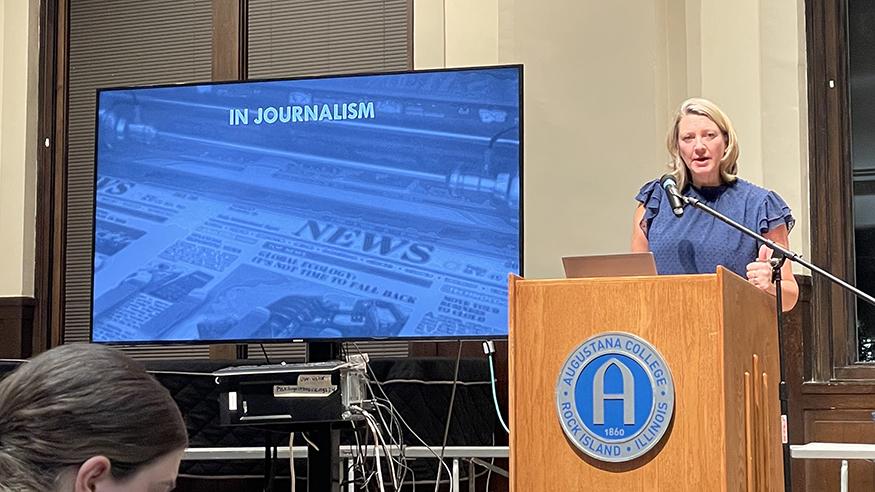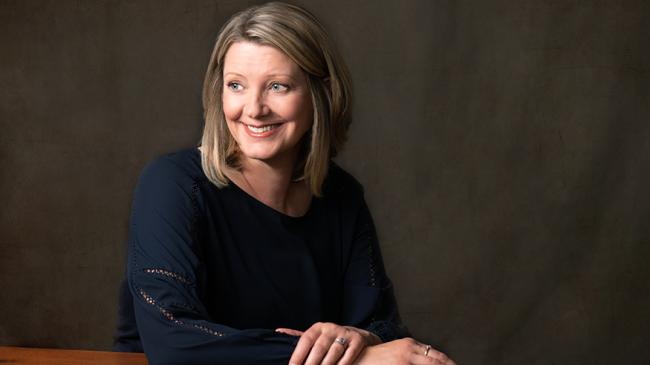
Dr. Dannagal Young discusses misinformation and political identity
The political science department recently hosted Dr. Dannagal Goldthwaite Young for a talk about her new book, "Wrong: How Media, Politics, and Identity Drive our Appetite for Misinformation" in Wallenberg Hall.
Dr. Young is a professor of communication and political science at the University of Delaware and director of the university's Center for Political Communication, where she studies the content, audience and effects of nontraditional political information. She is also an award-winning scholar and teacher, TED speaker and improvisational comedian.
"Wrong" explores how our social identities (how we think of ourselves as part of our political teams) encourage us to believe things that are untrue.
In her talk, Dr. Young explored how our mediated political world fuels "us versus them" dynamics in ways that reinforce and distill these identities, keeping our demand for identity-reinforcing falsehoods high.

Dr. Dannagal Young, professor of communication and political science at the University of Delaware and director of the university's Center for Political Communication, spoke at Augustana on Oct. 7.
Dr. Young explained that because of our evolutionary need for group membership and community, our social identities shape what we see and know.
"We are motivated to comprehend the world in keeping with our team, control the world in ways that serve our team, and experience community by connecting with and belonging to our team," she said.
Political elites then create caricature versions of social identities to create "political mega-identities" that, through media, can be used to grab our attention, evoke emotional responses and mobilize us.
"Political mega-identities are exploitable, and our identities are most obvious when they are under threat," said Dr. Young. "If I encounter media content that makes me feel like someone is coming for my team, I’m going to want to seek out content that makes me feel good about my team."
"Political mega-identities are exploitable, and our identities are most obvious when they are under threat."
Political elites, traditional journalists, partisan media and social media work together to fuel "us versus them" dynamics in ways that deliberately reinforce and distill these mega-identities, keeping our demand for identity-reinforcing falsehoods high.
Dr. Young's message is a timely one. As the 2024 Presidential Election unfolds, understanding the spread of information is especially important. Dr. Mariano Magalhães, chair/professor of political science, explains that misinformation and disinformation pose a threat to democracy.
"This election cycle highlights how misinformation, and, honestly, a lot of disinformation, has reinforced the tribalism and polarization we've seen in America over the past decade or so," Dr. Magalhães said. "Ultimately, the cross-party animosity — the perception of threats from the 'other side' — reduces the ability of our political leaders to cooperate, which is essential for democratic governance."
"Ultimately, the cross-party animosity — the perception of threats from the 'other side' — reduces the ability of our political leaders to cooperate, which is essential for democratic governance."
Amid the confusion and division surrounding misinformation, Dr. Young argues that we play an important role in shaping our political climate, even though the political framework we participate in is powerful and messy.
"I think Dr. Young hit the nail on the head when she argued that ordinary people, the citizens, of this country can play a key role in mitigating and minimizing the impact of misinformation and disinformation," said Dr. Magalhães.
How can we do our part? Dr. Young’s advice is simple:
"We need to be open to the possibility that we are wrong," she said. "We also need to give others the benefit of the doubt."
